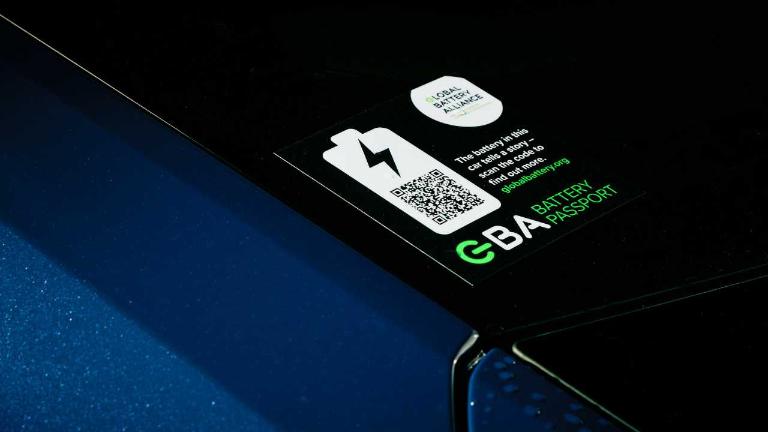Global Battery Alliance: a standard for battery certification
The Battery Passport creates a digital twin of each physical battery and contains information on all applicable sustainability requirements, based on a shared standard.
To establish a sustainable battery value chain by 2030 - that is the main goal of the Global Battery Alliance (GBA), a multi-stakeholder organization with more than 120 members from different fields, which at the annual meeting of the World Economic Forum in Davos, presented the proof of concept for its Battery Passport.
What is it all about? The Battery Passport is key to facilitating the rapid scaling of battery value chains that are sustainable, circular and responsible, with the aim of meeting the targets of the Paris Agreement through electrification of the transport and energy sectors.
Global Battery Alliance
The development of the Battery Passport took three years and was overseen by members of the Global Battery Alliance taking into account the entire value chain, from mining to recycling. Members, in addition to Audi and the Volkswagen Group, include companies such as BASF, CATL, Eurasian Resources Group, Glencore, LG Energy Solution, Umicore, and Tesla, as well as non-governmental and international organizations such as IndustriALL Global Union, Pact, Transport & Environment, UNEP, and UNICEF, not to mention support from government institutions such as the German Ministry for Economic Affairs and the government department Natural Resources Canada.
Battery Passport
Batteries are at the heart of the energy transition, but at the same time they are material- and resource-intensive with inevitable social and environmental impacts throughout the value chain: for example, the greenhouse gas emissions generated during material sourcing, processing and manufacturing, and issues of child labour and human rights violations.
That is why there is a need to increase transparency in these processes - and the introduction of the Battery Passport is a critical step in this regard in a rapidly growing industry. The Battery Passport is the GBA's main project and involves the creation of a digital twin of each physical battery, conveying information about all applicable sustainability and lifecycle requirements based on a common standard.
Value Chain
Thanks to the Battery Passport, the global battery value chain will be able to become more transparent, as reliable data will be shared that can be compared and will cover material provenance, chemical composition, production history and sustainability performance. And precisely because it is based on standardized, comparable and auditable data, it is a key tool for creating a global vision in this area. The goal is to provide end users with a quality seal certifying the sustainability of batteries, according to common rules defined by the stakeholders involved in the project - from industry, academia, nongovernmental organizations and governments.
Battery Passport prototypes related to the batteries used by Audi are currently published, which include information on the suppliers involved in its value chain; the data cover battery technical specifications, material sourcing and key sustainability performance indicators.
Sustainability and awareness
Included in the sustainability indicators are the battery's carbon footprint, performance on human rights and child labor issues, and how data is collected. In this way, the Battery Passport will enable end users to make more informed purchases and will drive sustainable sourcing, processing, and production practices in the industry. The Battery Passport has already been endorsed at the 2021 G7 Leaders’ Meeting, in the EU Battery Regulation, and by the Canadian and U.S. administrations. It will become a mandatory requirement in the European Union by 2026 with other regions likely to follow; even with this in mind, it will become a key tool for providing a globally harmonized information and regulatory environment.
Meanwhile, the Battery Passport architecture will continue to be implemented, including with the development of a comprehensive and simplified indicator framework. Rules and mechanisms will be created to calculate scores and regulate data governance, assurance and verification processes, including IT instruments. This will allow batteries to be benchmarked according to an unique definition, identifying the best and worst in class, while tracking progress in the industry through the issuance of a quality seal.

Twin Transition
"This proof of concept is an important step in increasing confidence in responsible and sustainable battery production and in the commitment to recycling and circularity", said Inga Petersen, Executive Director of the Global Battery Alliance. "The Battery Passport is an excellent example of the digital and green 'twin transition': it uses digitization to facilitate real-world decarbonization and promote circularity", added Robert Habeck, German Minister for Economic Affairs and Climate Action.
"More sustainable batteries are vital for the responsible transition to electric mobility. With this project we show that even complex value chains can become transparent. We hope that many other organizations, regulators, and industry players will join together to make the Battery Passport a truly shared global standard", said Markus Duesmann, Chairman of the Board of Management of AUDI AG, the lead brand for the project within the Volkswagen Group.
The new oil
"Batteries are the new oil, but to avoid the mistakes of the oil age, we must ensure they are produced sustainably, their materials are sourced responsibly, and the entire supply chain is circular. Transport & Environment has supported GBA's work from the outset to globally cement sustainability and responsible sourcing. The launch of the Battery Passport is a milestone in this journey because it will enable transparent disclosure of key sustainability and human rights data, thereby increasing transparency and trust throughout the supply chain," concluded Julia Poliscanova, Transport & Environment's Senior Director for Electric Mobility.
Source: AUDI AG
VGI | Responsible OU: VP | Creation date: article date | Class 9.1
